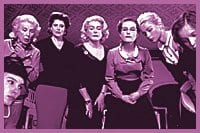Leave it French Director François Ozon to adapt a film from a corny murder mystery play, cast eight of France’s best known actresses, throw in some catfights and Sapphic trysts and turn the whole thing into a musical. Not only does Ozon get away with it, but he’s turned the result – 8 Women, which premiered in Canada earlier this month at the Toronto International Film Festival – into one of France’s biggest grossing films.
Inspired by Douglas Sirk melodramas and Vincent Minnelli musicals, Ozon’s lush and colourful 8 Women stars Catherine Deneuve, Fanny Ardent, Isabelle Huppert, Danielle Darrieux, Emmanuelle Béart, Virginie Ledoyen, Ludivine Sagnier and Firmine Richard as eight women trapped during a snowstorm in an isolated French mansion during the 1950s. Marcel, the family patriarch has been murdered, the phone line’s been cut, the car won’t start and the front gate is locked.
Each of the eight – Marcel’s wife, daughters, sister, mother-in-law and maids – had reasons to want him dead and when they all begin to suspect each other, the fur begins to fly.
Fresh from the success of his 2000 film Under The Sand (Sous le sable) which starred Charlotte Rampling as a woman who cannot accept the disappearance of her husband, Ozon was searching for an all-female script to satisfy what he calls his “obsession with women.” Initially he hoped to remake George Cukor’s The Women, only to find the rights had been held for several years by Meg Ryan and Julia Roberts. His agent gave him 8 Women, a 1970s French play by Robert Thomas, which Ozon freely adapted with his own subversive twists.
The gay filmmaker is best known for violent, sexually charged works like the murderous Hansel And Gretel fable Criminal Lovers and the sexually and psychologically sadistic Water Drops On Burning Rocks. Despite the murder at the centre of the film, 8 Women is a departure for the director, as close as Ozon might ever get to an entertaining romp.
“I could have done the film with unknown actresses,” he says, “but I immediately knew it would be funnier to see Catherine Deneuve and Isabelle Huppert fighting with each other. With other films, like Under The Sand, you want to forget the actors are stars. But with this, I didn’t want to forget that they were stars for one moment. I never thought I would get these actresses, but in the end I had my dream cast.”
Ozon uses his actresses’s iconic status and the film’s Agatha Christie-style intrigues to great camp effect. Less characters than types – ice queen, tramp, ingenue, domestic, spinster – the actresses vamp around the set in to-die-for period costumes and coiffures. And their eight, often awkwardly executed, song-and-dance routines heighten the film’s highly artificial feel.
“I wanted to make a democratic film,” Ozon says. “I wanted to give each actress a number, like a monologue, to explain different things. And I picked popular French songs from the period that were appropriate to the character. I didn’t want professionals to sing or dance. I think it was good and touching to have them dance and have them sing and show their vulnerability.”
Catherine Deneuve, who plays Gaby, the wife of the murder victim, calls Ozon “one of the few people I would consider a cineaste. His work is very provocative.” Deneuve says she appreciates that the film provided rare, substantial roles for its ensemble female cast, but says the film says very little that’s true about women.
“All these women are monsters. I think it’s a good film for actresses, but it’s not a good film for women. All the characters were monsters. If this same film were made by a straight man, I’d think that he was mean. If it had been made by a woman, I’d wonder what had happened to her in her childhood to make her so unhappy.”
On that point, Ozon, whose work has always explored the uglier side of human nature, disagrees.
“I don’t think these women are just monsters,” he says. “I don’t think it’s that black and white, though it might be easier for the actresses to think that so that they can have their distance from the roles. It might be dark, but even with a film like this, which is anti-naturalist, I like to show these different parts of humanity and these different sides of reality.”
*8 Women, in French with English subtitles, opens theatrically in Toronto on Fri, Sep 27.


 Why you can trust Xtra
Why you can trust Xtra


